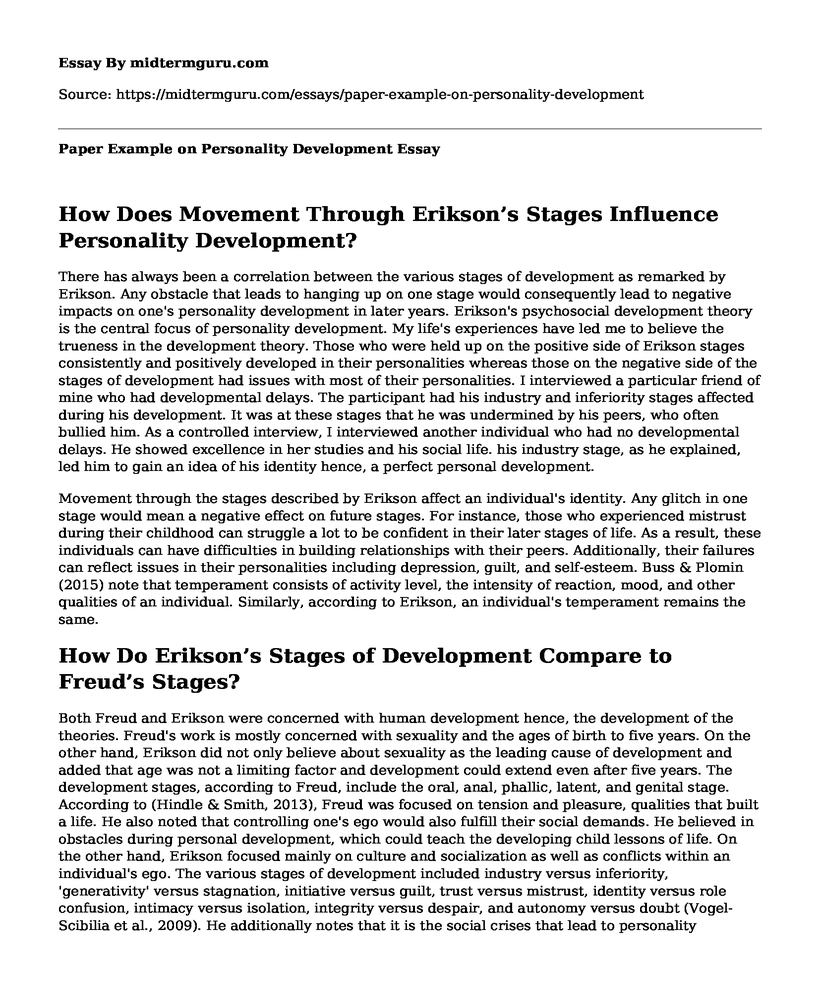How Does Movement Through Erikson’s Stages Influence Personality Development?
There has always been a correlation between the various stages of development as remarked by Erikson. Any obstacle that leads to hanging up on one stage would consequently lead to negative impacts on one's personality development in later years. Erikson's psychosocial development theory is the central focus of personality development. My life's experiences have led me to believe the trueness in the development theory. Those who were held up on the positive side of Erikson stages consistently and positively developed in their personalities whereas those on the negative side of the stages of development had issues with most of their personalities. I interviewed a particular friend of mine who had developmental delays. The participant had his industry and inferiority stages affected during his development. It was at these stages that he was undermined by his peers, who often bullied him. As a controlled interview, I interviewed another individual who had no developmental delays. He showed excellence in her studies and his social life. his industry stage, as he explained, led him to gain an idea of his identity hence, a perfect personal development.
Movement through the stages described by Erikson affect an individual's identity. Any glitch in one stage would mean a negative effect on future stages. For instance, those who experienced mistrust during their childhood can struggle a lot to be confident in their later stages of life. As a result, these individuals can have difficulties in building relationships with their peers. Additionally, their failures can reflect issues in their personalities including depression, guilt, and self-esteem. Buss & Plomin (2015) note that temperament consists of activity level, the intensity of reaction, mood, and other qualities of an individual. Similarly, according to Erikson, an individual's temperament remains the same.
How Do Erikson’s Stages of Development Compare to Freud’s Stages?
Both Freud and Erikson were concerned with human development hence, the development of the theories. Freud's work is mostly concerned with sexuality and the ages of birth to five years. On the other hand, Erikson did not only believe about sexuality as the leading cause of development and added that age was not a limiting factor and development could extend even after five years. The development stages, according to Freud, include the oral, anal, phallic, latent, and genital stage. According to (Hindle & Smith, 2013), Freud was focused on tension and pleasure, qualities that built a life. He also noted that controlling one's ego would also fulfill their social demands. He believed in obstacles during personal development, which could teach the developing child lessons of life. On the other hand, Erikson focused mainly on culture and socialization as well as conflicts within an individual's ego. The various stages of development included industry versus inferiority, 'generativity' versus stagnation, initiative versus guilt, trust versus mistrust, identity versus role confusion, intimacy versus isolation, integrity versus despair, and autonomy versus doubt (Vogel-Scibilia et al., 2009). He additionally notes that it is the social crises that lead to personality development (Jung, 1970). However, they believed that every person has a set of defined stages with some crises which should lead to effective personality development. Their stages also encompass similar ages.
Which Theory Best Explains Personality Development?
I believe that Erikson's theory better describes an individual's personality development. For instance stages such as trust versus mistrust are essential for any kid as they trust their mother's decisions better than anyone else's. His stages of Identity and role confusion also better describe my realization and what I wanted in life. I interacted with various meaningful people, who could assist me in reaching for my goals. Erikson's theory focuses mostly on lifetime development as compared to Freud's, which encompasses sexuality as a determinant of personality development (Specht, 2017).
References
Buss, A. H., & Plomin, R. (2015). Temperament: Early developing personality traits. London and New York: Psychology Press.
Hindle, D., & Smith, M. V. (2013). Personality Development A Psychoanalytic Perspective. London: Taylor and Francis.
Jung, C. G. (1970). The development of personality. London: Routledge and Kegan Paul.
Specht, J. (2017). Personality development across the lifespan. Cambridge, MA: Academic Press.
Vogel-Scibilia, S. E., Mcnulty, K. C., Baxter, B., Miller, S., Dine, M., & Frese, F. J. (2009). The Recovery Process Utilizing Erikson's Stages of Human Development. Community Mental Health Journal,45(6), 405-414. doi:10.1007/s10597-009-9189-4
Cite this page
Paper Example on Personality Development. (2022, Oct 19). Retrieved from https://midtermguru.com/essays/paper-example-on-personality-development
If you are the original author of this essay and no longer wish to have it published on the midtermguru.com website, please click below to request its removal:
- Article Analysis Essay: Walking on Sunshine
- Paper Example on Pamphlet Anxiety and OCD
- Case Study on James Post Traumatic Stress Disorder
- Two Theories on Personhood: Ego & Bundle Theory - Essay Sample
- Managing Anxiety: Establishing a Therapeutic Alliance - Essay Sample
- Cognitive Aging: Developmental Processes Across Adulthood - Resesarch Paper
- Buchanan Unites Conservatives on Moral Issues in Bush Speech - Essay Sample







